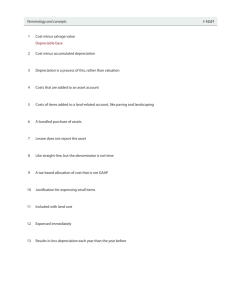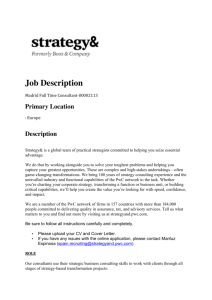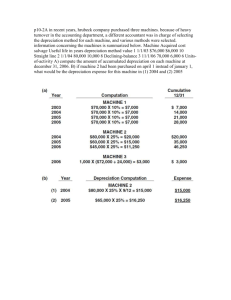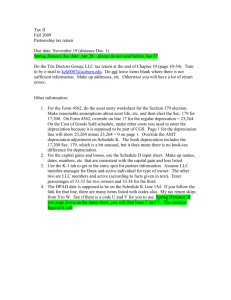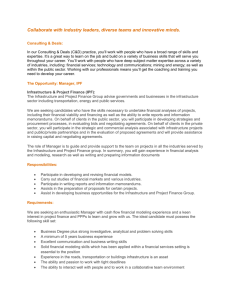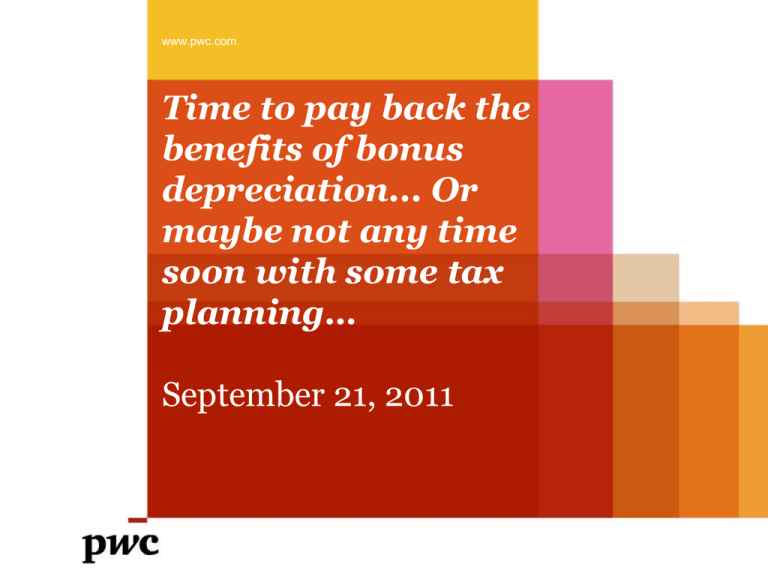
www.pwc.com
Time to pay back the
benefits of bonus
depreciation... Or
maybe not any time
soon with some tax
planning…
September 21, 2011
What is Bonus Depreciation and why does it
matter to my company?
•
Bonus Depreciation is a business targeted stimulus dating back
to September 11, 2001 that accelerates tax depreciation.
•
Tax depreciation is the amount of your investment in an asset
that you may deduct from your income in a given year. The
deductions related to most non-building assets ordinarily must be
spread out over 5 or 7 year period for tax purposes.
•
Bonus has been extended multiple times, and temporarily
increases the percentage to 100% immediate deductibility of
asset purchases for part of 2010, and all of 2011.
•
President Obama’s recent proposal includes an extension of 100%
bonus depreciation for 2012.
PwC
Page 2
Bonus Depreciation Impact
Increases depreciation, reduces asset basis.
• When you sell an asset, you pay tax on the difference of the final
sales price and what you have deducted in total for depreciation
purposes.
• This is tax timing related – This will increase your
deductions in early years, reducing your current tax
liability, which will have the effect of decreasing your
deductions in later years, increasing your tax liability.
• While accelerating deductions is generally taxpayer favorable, it
can be devastating if the later decreased deductions and increased
taxes are not factored into cash projections.
PwC
Page 3
Bonus Depreciation Impact – the numbers
With 50% Bonus
Depreciation
With 100% Bonus
Depreciation
Description of Activity
Asset Cost acquired in 2011
$20,000
$20,000
Bonus Depreciation for 2011
($10,000)
($20,000)
Depreciation taken in 2011
($2,000)
$0
Depreciation taken in 2012
($1,600)
$0
Federal Tax Basis
$6,400
$0
Sales Price
$12,000
$12,000
Tax gain realized on sale
$5,600
$12,000
Tax gain recognized on sale
$5,600
$12,000
Less Federal taxes @ 40%
($2,240)
($4,800)
Cash available for reinvestment
$9,760
$7,200
Additional Cash from Depreciation
$5,440
$8,000
$15,200
$15,200
PwC
Tracking
A
B
C
D
E=A-(B+C+D)
F
G
H=G
I=H*40%
J=F-I
K=(B+C+D)*40%
L=J+K
Page 4
Like Kind Exchanges
Enacted in 1924, the Like Kind
Exchange provisions under IRC
Section 1031 provide companies
with an opportunity to defer the
recognition of taxable gains on
the disposition of business
assets if they utilize the
proceeds to purchase similar,
"like-kind" assets.
• Tax Recognized becomes tax gain
deferred if a vehicle follows the
rules of Section 1031 by fully
replacing the asset with a like kind
vehicle.
PwC
Without
LKE
With LKE
Asset acquired in 2011
$20,000
$20,000
Sold in 2013 for
$12,000
$12,000
Depreciation allowed,
including 100% bonus
($20,000)
($20,000)
Tax basis when sold
$0
$0
Sales proceeds
$12,000
$12,000
Less tax basis
$0
$0
Tax gain realized on sale
$12,000
$12,000
Tax gain recognized on
sale
$12,000
$0
Less taxes due @ 40%
($4,800)
$0
Cash available for
reinvestment
$7,200
$12,000
Cash flow impact
$4,800
Page 5
LKE Example. Scenario 1: A got land for free, $0 tax
basis. B just bought her tract and paid $50. $50 tax
basis.
Scenario 2: Railroad comes in and splits their fields.
1.
PwC
2.
Page 6
Scenario 2: If they sell ½ of their land to the other to
get to Scenario 3, A will pay tax on $25 in gain, and B
will pay $0 in tax. A may not have liquidity to pay
that tax. If they swap with LKE, no taxable event.
2.
PwC
3.
Page 8
How do you qualify all of your transactions for
LKE treatment?
PwC builds a program around your existing business processes,
following an IRS established template and safe harbors, that
allow you to indefinitely defer income tax on gain from the sale of your
rental assets for as long as you stay in the same business.
Blue Bird Auto Rental Systems have a PwC LKE file export
option that allows PwC to connect your data to the same LKE engine
that powers the LKE Programs of over 100 clients. Blue Bird users can
leverage off of this export to streamline and simplify the technology
implementation of a PwC LKE program.
The potential gain deferral is the value of the rental fleet multiplied by
the blended Federal and State tax rates, typically 40%.
PwC
Page 8
Questions and answers…
This publication has been prepared for general guidance on matters of interest only, and
does not constitute professional advice. You should not act upon the information
contained in this publication without obtaining specific professional advice. No
representation or warranty (express or implied) is given as to the accuracy or
completeness of the information contained in this publication, and, to the extent permitted
by law, PwC LLC, its members, employees and agents do not accept or assume any
liability, responsibility or duty of care for any consequences of you or anyone else acting,
or refraining to act, in reliance on the information contained in this publication or for any
decision based on it.
© 2011 PwC LLC. All rights reserved. In this document, “PwC” refers to PwC LLC which
is a member firm of PricewaterhouseCoopers International Limited, each member firm of
which is a separate legal entity.

